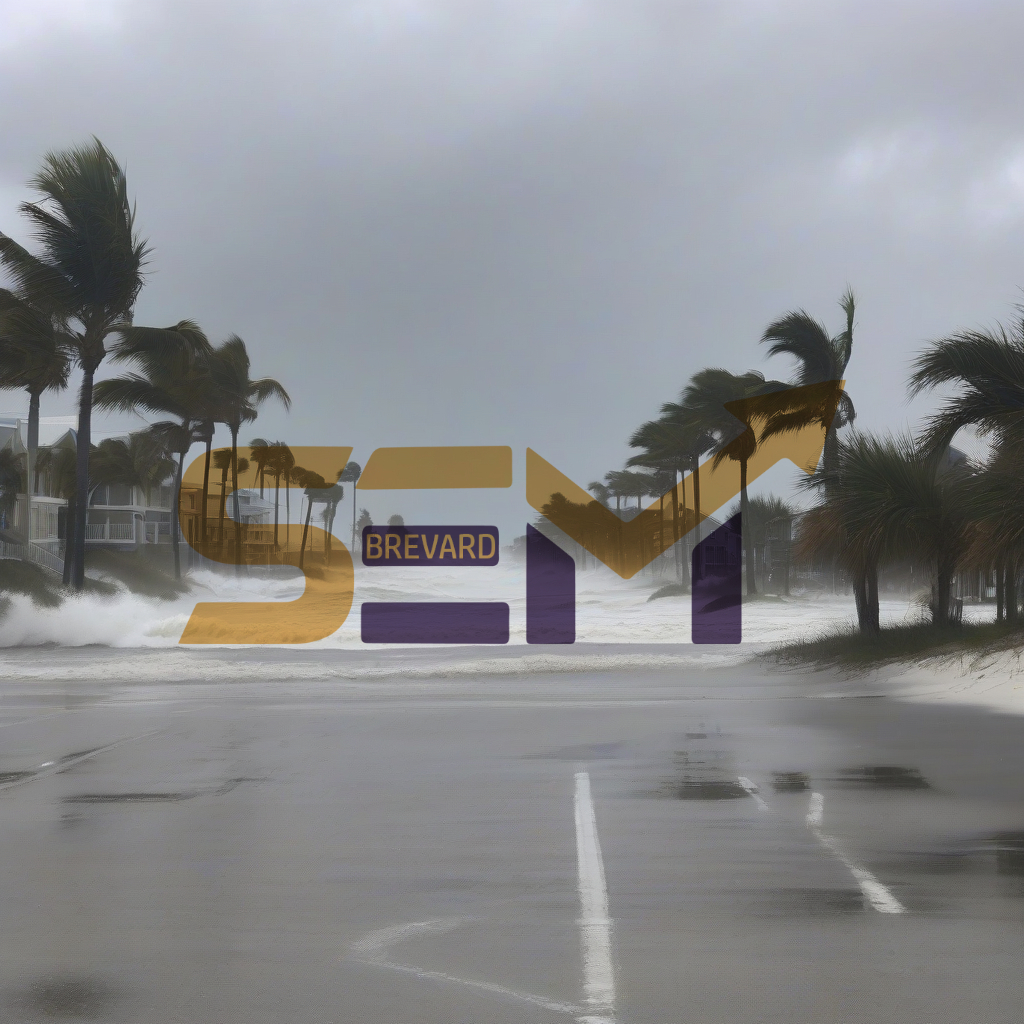
Hurricane season, which officially runs from June 1 to November 30, poses significant challenges for businesses in coastal cities, with our beloved Melbourne, Florida, being no exception.
Our region, located in Brevard County, frequently faces the threat of tropical storms and hurricanes, leading to potentially devastating impacts on local businesses.
Although we’re focusing on Melbourne, FL in this article, because that’s where our office is located, this article is relevant to all of our neighboring cities, towns and counties across the great state of Florida.
The unpredictability of these weather events necessitates that business owners adopt proactive strategies to mitigate risks and protect their operations. This article will delve into the effects of hurricane season on Melbourne’s (and neighboring cities’) businesses and provide actionable preparation strategies for owners.
Impacts of Hurricane Season on Local Businesses
Physical Damage:
One of the most immediate concerns for businesses during hurricane season is physical damage to property. High winds, flooding, and storm surges can wreak havoc on infrastructure, leading to costly repairs. According to the National Oceanic and Atmospheric Administration (NOAA), an average of $12 billion is spent annually on hurricane damage across the United States (NOAA, 2021).
Supply Chain Disruptions:
Following a hurricane, supply chains can be severely affected. Melbourne businesses rely on timely deliveries of goods and materials, but hurricanes can cause delays or even complete halts in transport. The Federal Emergency Management Agency (FEMA) highlights the importance of having contingency plans in place to address these disruptions (FEMA, 2022).
Loss of Revenue:
Hurricanes can result in extended closures if businesses are damaged or if the surrounding infrastructure is compromised. Loss of revenue during these periods can be crippling—especially for small businesses that may not have sufficient cash reserves to sustain operations during downtimes. A study by the Institute for Business & Home Safety shows that approximately 25% of businesses never reopen after a major disaster (IBHS, 2018).
Insurance Considerations:
While many businesses understand the need for insurance, the associated costs and complexities can lead to insufficient coverage. Businesses in Melbourne often find themselves navigating policies that may leave gaps, especially when it comes to flood damage, which is commonly not covered under standard commercial property insurance (Insurance Information Institute, 2023).
Preparation Strategies for Business Owners
Risk Assessment and Business Continuity Planning:
The first step for any business owner is to conduct a risk assessment of their operations. Identifying critical assets and evaluating vulnerabilities can help in developing a robust business continuity plan. This plan should include protocols for evacuation, communication strategies, and steps for securing property prior to a storm. Resources for business continuity planning can be found on the Small Business Administration (SBA) website (SBA, 2023).
Strengthening Physical Infrastructure:
Investing in building improvements can significantly mitigate the impact of hurricanes. This could involve reinforcing roofs, installing storm shutters, and elevating structures to reduce flooding risks. According to a report from the Federal Alliance for Safe Homes, hardening a building can save business owners money in the long run by reducing damage during hurricanes (FLASH, 2020).
Inventory Management:
Businesses should recognize the importance of managing inventory, especially perishable items. Developing an inventory management plan that includes strategies for minimizing waste during outages and identifying suppliers who can deliver quickly in case of disruptions is essential. Collaborating with local suppliers can provide an advantage post-storm, as they may also prioritize restoring service to their community.
Communication Plans:
Having clear communication strategies in place can enhance the safety and security of employees and customers. Businesses should maintain updated contact information for key staff and stakeholders, as well as establish channels for relaying timely information. This could involve setting up a dedicated messaging system or using social media to keep customers informed about closures or re-opening plans.
Training Employees:
All employees should be trained on emergency protocols, including evacuation routes, safety measures, and how to respond in the event of a hurricane. Regularly scheduled drills can ensure that everyone is familiar with these procedures and can react quickly in a real emergency.
Investing in Insurance:
Business owners must thoroughly evaluate their insurance coverage to ensure it includes protection against potential hurricane-related damages. Consulting with an insurance agent specializing in commercial policies can provide insights into necessary coverage adjustments. The Insurance Information Institute states that having comprehensive coverage can be crucial in ensuring the longevity of a business in the aftermath of a disaster (III, 2023).
Community Involvement and Networking:
Engaging with local chambers of commerce and business networks can provide additional resources and support. Such involvement offers the opportunity to share best practices with other business owners facing similar challenges. Collaboration can lead to the formation of community response teams, creating stronger networks for assistance during hurricane preparations and recovery.
Emergency Fund Allocation:
Setting aside funds specifically for emergency situations can help businesses manage unexpected expenses that arise during hurricane season. This financial cushion can cover repairs, lost inventory, or the costs associated with business downtime. The U.S. Small Business Administration recommends that businesses maintain a financial reserve to support recovery activities after disasters (SBA, 2023).
With a little planning and preparation, it’s not so bad.
The impact of hurricane season on businesses in Melbourne, FL, is significant and far-reaching. However, through diligent preparation and strategic planning, business owners can mitigate risks and enhance their resilience against these natural disasters.
Implementing systems for risk assessment, infrastructure strengthening, effective communication, and employee training, businesses not only safeguard their operations but also contribute to the overall resilience of the local community. For further insights and resources on hurricane preparedness, business owners can visit Ready.gov for valuable tips and strategies tailored to meet their unique needs.
References
- NOAA. (2021). “Hurricanes: A Study of Damage Costs.“
- FEMA. (2022). “Business Disaster Recovery Planning.“
- IBHS. (2018). “The Impact of Natural Disasters on Businesses.“
- Insurance Information Institute. (2023). “Understanding Business Insurance.“
- FLASH. (2020). “Hurricane Mitigation Resources.“
- SBA. (2023). “Preparing for Business Emergencies.“
- III. (2023). “Comprehensive Coverage for Businesses.”
